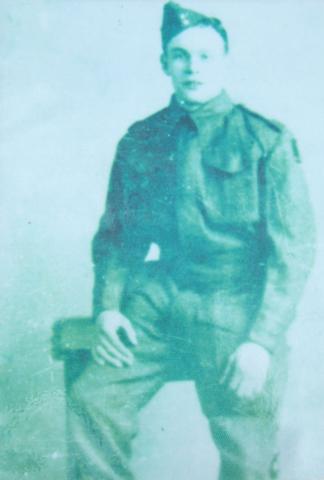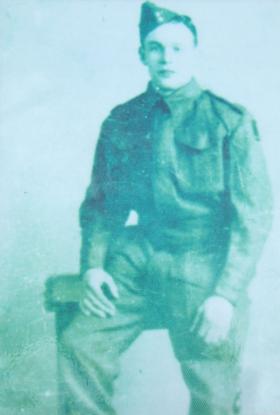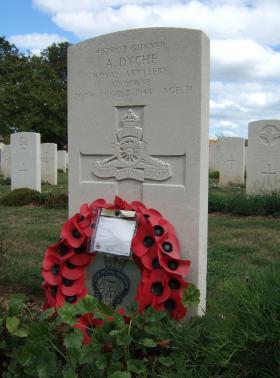Albert Dyche was the son of Samuel and Eva Maria Dyche, of Rushall, Staffordshire.
He was enlisted into the Royal Artillery in 1941 and later volunteered for service with airborne forces. On completion of his selection he was posted to the 3rd Airlanding Anti-Tank Battery RA, a glider-borne support unit for the 3rd Parachute Brigade in the newly formed 6th (British) Airborne Division.
Having embarked on a landing ship at Gosport because of a shortage of gliders, No 3 Battery made an amphibious landing on the Normandy beaches on 7 June 1944 following four days at sea. After landing at Lion Sur Mer, and re-grouping at Colleville, the battery moved to Ranville to meet up with its parachute advance party. The battery then operated in Normandy for the next three months.
The battery’s war diary records that on the morning of 19 August B and C Troops were subjected to heavy enemy mortar fire, which resulted in a jeep being destroyed and six other ranks (ORs) wounded.
Gunner Dyche was one of the ORs wounded in the jeep and was taken back to a field hospital where, unfortunately, he died of his wounds the next day.
The Officer Commanding No 3 Battery wrote a letter to his father, on 7 September 1944:
"Dear Mr. Dyche, I have just heard from Bill French that you have received notification from the War Office that your son has died of wounds he received while in action. I cannot tell you how greatly I sympathise with you in your great loss. Bert was a son that any father could well be proud of and if my own son grows up to be as fine a man as your Bert, I shall be very pleased and very proud. Bert’s cheerfulness and courage throughout the whole campaign was an inspiration to us all. He was the best and bravest soldier that any commander could ask for and was a man that I feel honoured to have fought beside and to have called a friend. I feel sure that painful as it is, you would like to know the full story of what actually happened. On 19th August this division was engaged in driving the enemy from the river Orne to the Seine and clearing the coast as far as the west bank of the Seine. It was the left flank of General Montgomery’s great encircling move about which you will have read in the papers. Bert’s Troop was supporting some paratroops who were attacking in an infantry role, a village on a hill that commanded a crossing over a river. Their job was to get into the village as soon as it was captured and consolidate and give support against a possible counter attack as the Germans were known to have tanks in the area. All of us knew the dangers and the difficulties of what we had to do, but Bert never hesitated for one moment, and started up his jeep just as coolly and just as calmly as if he were going for a Sunday afternoon drive. I myself went with them and as I was travelling in the next jeep saw everything that happened. The Germans had been shelling and mortaring us very heavily all the time and he opened up again just as we were nearly there. One shell fell almost on top of Bert’s jeep, setting it ablaze and wounding the complete detachment. I got the remainder of the men and jeeps under cover and while I was doing this Bert was carried in. We did everything we could for him and the others, put them in a jeep and rushed them back to the nearest hospital. Though I knew that poor Bert had been badly hit I had every hope that he would recover and his death has come as a frightful shock to me. I am afraid I cannot tell you where he was buried for, as I know you will understand in all the worry and heat of fighting a battle that moved as quickly as that last battle of ours did, one loses touch very quickly. On top of that we were suddenly withdrawn and returned to England. I will however, try my very hardest to find out and I will let you know immediately I hear anything. No words of mine, Mr. Dyche, can console you for the loss of such a fine boy as Bert, but I do ask you to believe that I feel for you from the very bottom of my heart.
With all my very deepest sympathy,
Yours very sincerely,
Joe Woodrow (Major RA)"
Gunner Albert Dyche died on 20 August 1944, aged 21 years, and is now buried in La Delivrande War Cemetery, Douvres, France.
Compiled by Bob Hilton
Read More



Latest Comments
There are currently no comments for this content.
Add Comment
In order to add comments you must be registered with ParaData.
If you are currently a ParaData member please login.
If you are not currently a ParaData member but wish to get involved please register.